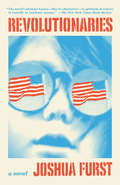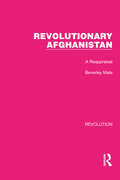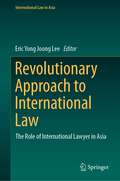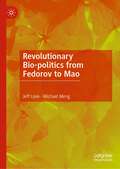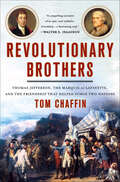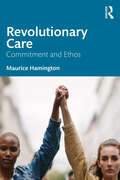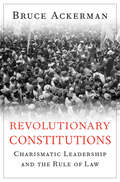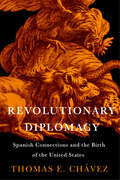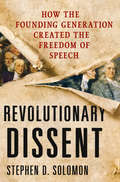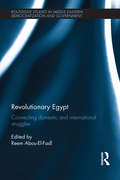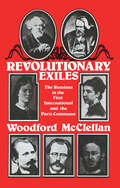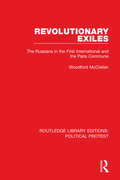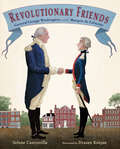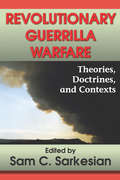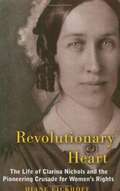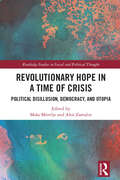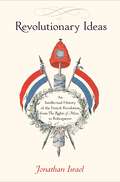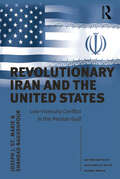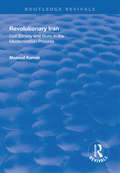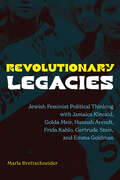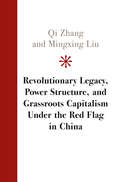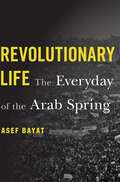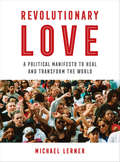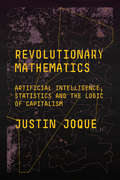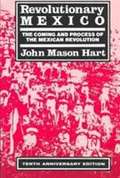- Table View
- List View
Revolutionaries: A novel
by Joshua Furst Joshua SessionsIn his second novel, the acclaimed author of The Sabotage Café leads us on a long, strange trip through the heart of the sixties and beyond, as seen through the eyes of the revolution's poster child.Fred is the sole offspring of Lenny Snyder, the famous (or notorious) pied piper of the counterculture, and in middle age he hates being reminded of it. But neither can he ignore any longer his psychedelically bizarre childhood. From infancy, for instance, he was called Freedom (in fact his given name) not only by those who should have known him but also by members of the burgeoning movement led by his father, who happily exploited having his wife and his toddling, then walking and talking, and finally observant son in tow. Thanks to Fred, this charismatic, brilliant, volatile ringmaster is as captivating in these pages as he was to his devoted disciples back then. We watch Lenny organize hippies and intellectuals, stage magnificent stunts, and gradually lose his magnetic confidence and leading role as the sixties start slipping away. He demands loyalty but gives none back in return, a man who preaches love but treats his family with almost reflexive cruelty. And Fred remembers all of it--the chaos, the spite, the affection. A kaleidoscopic saga, this novel is at once a profound allegory for America--where we've been and where we're going--and a deeply intimate portrait of a father and son who define our times.
Revolutionary Afghanistan: A Reappraisal (Routledge Library Editions: Revolution #26)
by Beverley MaleThis book, first published in 1982, examines the reality of the so-called revolution in Afghanistan. It focuses on the career of Hafizullah Amin, considered in the West as a near-genocidal mass murderer, intent on establishing a personal fiefdom in Afghanistan. However, this book argues that he was a man struggling against impossible odds to preserve his country’s independence and at the same time drag it into the twentieth century. He commanded such loyalty and support within the Afghanistan Communist Party and the armed forces that the Russians had to invade to get rid of him.
Revolutionary Approach to International Law: The Role of International Lawyer in Asia (International Law in Asia)
by Eric Yong Joong LeeThis book brings together critical legal analyses of ongoing global issues in the digital age by international lawyers in Asia. Digital revolution is the key to understanding the contemporary human society. In this book, the authors critically redefine the mainstream thinking and ideas of contemporary international legal issues that the global community is facing. Given the rapidly shifting global legal landscape and framework, they shed light on the theoretical and practical questions in international law and reexamine their global context. Such independent and forward-looking approach suggests the ideas to shaping the global common good in the future human society.IIn both theory and practice, this book is a useful guide to Asian law, politics, economy, and business providing a fair and balanced point of view.
Revolutionary Bio-politics from Fedorov to Mao
by Michael Meng Jeff LoveThis book confronts the question of immortality: Is human life without immortality tolerable? It does so by exploring three attitudes to immortality expressed in the context of three revolutions, the Soviet, the Nazi and the Communist revolution in China. The book begins with an account of the radical Russian tradition of immortalism that culminates in the thought of Nikolai Fedorov (1829-1903), then contrasting this account with the equally radical finitism of Martin Heidegger (1889-1976). Both these strands are then developed in the context of modern Chinese philosophical thinking about technology and the creation of a harmonious relation to nature that reflects in turn a harmonious relation to mortality, one that eschews the radicality of both Fedorov and Heidegger by discerning a “middle way.”
Revolutionary Brothers: Thomas Jefferson, the Marquis de Lafayette, and the Friendship that Helped Forge Two Nations
by Tom Chaffin“Chaffin’s well-told tale of two revolutions centers on the fascinating, sometimes intersecting careers of Thomas Jefferson and the Marquis de Lafayette.” —Peter S. Onuf, coauthor of the New York Times bestseller, Most Blessed of PatriarchsThomas Jefferson and the Marquis de Lafayette shared a singularly extraordinary friendship, one involved in the making of two revolutions—and two nations. Jefferson first met Lafayette in 1781, when the young French-born general was dispatched to Virginia to assist Jefferson, then the state’s governor, in fighting off the British. The charismatic Lafayette, hungry for glory, could not have seemed more different from Jefferson, the reserved statesman. But when Jefferson, a newly-appointed diplomat, moved to Paris three years later, speaking little French and in need of a partner, their friendship began in earnest.As Lafayette opened doors in Paris and Versailles for Jefferson, so too did the Virginian stand by Lafayette as the Frenchman became inexorably drawn into the maelstrom of his country’s revolution. Jefferson counseled Lafayette as he drafted The Declaration of the Rights of Man and remained a firm supporter of the French Revolution, even after he returned to America in 1789. By 1792, however, the upheaval had rendered Lafayette a man without a country, locked away in a succession of Austrian and Prussian prisons. The burden fell on Jefferson, along with Lafayette’s other friends, to win his release. The two would not see each other again until 1824, in a powerful and emotional reunion at Jefferson’s Monticello.Steeped in primary sources, Revolutionary Brothers casts fresh light on this remarkable, often complicated, friendship of two extraordinary men.“A compelling narrative of an epic—and unlikely—friendship from the Enlightenment era.” —Walter S. Isaacson, #1 New York Times–bestselling author
Revolutionary Care: Commitment and Ethos
by Maurice HamingtonWritten by one of the world’s most respected care scholars, Revolutionary Care provides original theoretical insights and novel applications to offer a comprehensive approach to care as personal, political, and revolutionary. The text has nine chapters divided into two major sections. Section 1, "Thinking About Better Care," offers four theoretical chapters that reinforce the primacy of care as a moral ideal worthy of widespread commitment across ideological and cultural differences. Unlike other moral approaches, care is framed as a process morality and provides a general trajectory that can only determine the best course of action in the moment/context of need. Section 2, "Invitations and Provocations: Imagining Transformative Possibilities," employs four case studies on toxic masculinity, socialism and care economy, humanism and posthumanism, pacifism, and veganism to demonstrate the radical and revolutionary nature of care. Exploring the thinking and writing of many disciplines, including authors of color, queer scholars, and indigenous thinkers, this book is an exciting and cutting-edge contribution to care ethics scholarship as well as a useful teaching resource.
Revolutionary Constitutions: Charismatic Leadership and the Rule of Law
by Bruce AckermanOffering insights into the origins, successes, and threats to revolutionary constitutionalism, Bruce Ackerman takes us to India, South Africa, Italy, France, Poland, Burma, Israel, Iran, and the U.S. and provides a blow-by-blow account of the tribulations that confronted popular movements in their insurgent campaigns for constitutional democracy.
Revolutionary Diplomacy: Spanish Connections and the Birth of the United States (The Revolutionary Age)
by Thomas E. ChávezUncovering the decisive role of Spanish diplomacy in securing American independence Without Spanish assistance, the thirteen American colonies could not have achieved their independence from the British crown. Alongside the more widely known contributions of France, Spanish men, material, and—most important—diplomatic muscle played a decisive role in the American Revolution. Using Benjamin Franklin as a guide through the European halls of power, celebrated scholar Thomas Chávez details the tense exchanges, successes, and failures of America&’s crucial collaboration with Spain during our War for Independence. The Spanish were responsible for driving the British from west Florida, and cities such as Galveston, Texas (named for Bernardo de Gálvez), still testify to the depths of Americans&’ gratitude. Chávez also introduces readers to Franklin&’s fellow American envoys Silas Deane, Arthur Lee, John Jay, and Robert Morris, recounting their dramatic negotiations with the Count of Vergennes, the Count of Aranda, and the Count of Floridablanca at the Spanish court. As Chávez shows, the diplomatic exchanges between the Continental Congress and the Spanish king, made through these pivotal intermediaries, expanded a colonial rebellion into a world war.
Revolutionary Dissent: How the Founding Generation Created the Freedom of Speech
by Stephen D. SolomonWhen members of the founding generation protested against British authority, debated separation, and then ratified the Constitution, they formed the American political character we know today-raucous, intemperate, and often mean-spirited. Revolutionary Dissent brings alive a world of colorful and stormy protests that included effigies, pamphlets, songs, sermons, cartoons, letters and liberty trees. Solomon explores through a series of chronological narratives how Americans of the Revolutionary period employed robust speech against the British and against each other. Uninhibited dissent provided a distinctly American meaning to the First Amendment's guarantees of freedom of speech and press at a time when the legal doctrine inherited from England allowed prosecutions of those who criticized government.Solomon discovers the wellspring in our revolutionary past for today's satirists like Jon Stewart and Stephen Colbert, pundits like Rush Limbaugh and Keith Olbermann, and protests like flag burning and street demonstrations. From the inflammatory engravings of Paul Revere, the political theater of Alexander McDougall, the liberty tree protests of Ebenezer McIntosh and the oratory of Patrick Henry, Solomon shares the stories of the dissenters who created the American idea of the liberty of thought. This is truly a revelatory work on the history of free expression in America.
Revolutionary Egypt: Connecting Domestic and International Struggles (Routledge Studies in Middle Eastern Democratization and Government)
by Reem Abou-El-FadlIn 2011 the world watched as Egyptians rose up against a dictator. Observers marveled at this sudden rupture, and honed in on the heroes of Tahrir Square. Revolutionary Egypt analyzes this tumultuous period from multiple perspectives, bringing together experts on the Middle East from disciplines as diverse as political economy, comparative politics and social anthropology. Drawing on primary research conducted in Egypt and across the world, this book analyzes the foundations and future of Egypt’s revolution. Considering the revolution as a process, it looks back over decades of popular resistance to state practices and predicts the waves still to come. It also confidently places Egypt’s revolutionary process in its regional and international contexts, considering popular contestation of foreign policy trends as well as the reactions of external actors. It draws connections between Egyptians’ struggles against domestic despotism and their reactions to regional and international processes such as economic liberalization, Euro-American interventionism and similar struggles further afield. Revolutionary Egypt is an essential resource for scholars and students of social movements and revolution, comparative politics, and Middle East politics, in particular Middle East foreign policy and international relations.
Revolutionary Exiles: The Russians in the First International and the Paris Commune
by Woodford McClellanFirst Published in 1979. Routledge is an imprint of Taylor & Francis, an informa company.
Revolutionary Exiles: The Russians in the First International and the Paris Commune (Routledge Library Editions: Political Protest #23)
by Woodford McClellanThis book, first published in 1979, examines the little-studied forerunners of the Russian revolutionary movement – the Russian section of the First International. It looks at the social democratic and Marxist Russians in the International, as well as examining the complex relations between the terrorist Sergei Nechaev and Marx’s friends, as well as tracing the activities of Michael Bakunin. It also analyses, for the first time in English, the activities of the Russian revolutionaries in the Paris Commune. It integrates early Russian social democracy into the larger context of European socialist and working-class movements.
Revolutionary Friends: General George Washington and the Marquis de Lafayette
by Selene CastrovillaSociety of School Librarians International Book Award HonorCalifornia Reading Association Eureka! Nonfiction HonorBank Street College Best Children's Book of the YearBooklist Top Ten Biography for YouthYoung fans of the smash Broadway hit "Hamilton" will enjoy this narrative nonfiction picture book story about the important friendship between George Washington and the Marquis de Lafayette during the Revolutionary War. Lafayette has come to America to offer his services to the patriotic cause. Inexperienced but dedicated, he is a much-needed ally and not only earns a military position with the Continental Army but also Washington's respect and admiration. This picture book presents the human side of history, revealing the bond between two famous Revolutionary figures. Both the author and illustrator worked with experts and primary sources to represent both patriots and the war accurately and fairly.
Revolutionary Guerrilla Warfare: Theories, Doctrines, and Contexts
by Sam C. Sarkesian'Revolution' is a word that causes fear in some, exhilaration in others, and confusion in most. Originally used to describe a restoration, it eventually came to mean a sweeping, sudden attack on an existing order. Human history has borne witness to a variety of national and social revolutions - population revolution, revolution of ideas, technological revolution, and revolution in education. Simultaneously, there has been a proliferation of literature on revolution, armed struggle, and violence aimed at unseating policies and leadership of governments and societies.Revolutionary struggles are more than simply armed internal conflict; they involve the essence of the political system. The desire to make such phenomena understandable often leads to oversimplification. Attempts to encompass their multi-dimensional nature, on the other hand, can become immersed in complexities, ambiguities, and misinterpretations. The perspective of this classic volume, available in paperback for the first time, is that revolution is here to stay. Guerrilla warfare, according to Sarkesian, is a particularly useful strategy for the weak, the frustrated, the alienated, and seekers of power against existing regimes. The collected works in this volume examine the social roots of revolution, development of strategy and tactics, practice in city and countryside, dilemmas of attackers and defenders.The actors and thinkers collected and analyzed here range from leading political analysts, anthropologists, sociologists, historians, and officials as well as practitioners of guerrilla warfare. This core text with primary sources in the area of war, revolution, and insurgence develops an understanding of revolution, traces the growth of guerilla doctrine, and studies the specifics of revolutionary and counterrevolutionary guerilla warfare.
Revolutionary Heart: The Life of Clarina Nichols and the Pioneering Crusade for Women's Rights
by Diane EickhoffClarina Nichols left the comforts of her Vermont home and moved West to the wild frontier to end the mistreatment of women. She helped to shape the state's new Constitution to free slaves and give women rights they had no where else in America.
Revolutionary Hope in a Time of Crisis: Political Disillusion, Democracy, and Utopia (Routledge Studies in Social and Political Thought)
by Alex Zamalin Maša MrovljeRevolutionary Hope in a Time of Crisis takes up the question of how to theorize and revive revolutionary hope in the present era of political disillusion. The collection consists of new cutting-edge research essays written by an interdisciplinary mix of established and emerging scholars, bringing together a wide range of intellectual traditions and perspectives. The contributors confront the challenge of relearning hope by exploring the politically transformative potential of past disappointments and defeats. They encourage us to acknowledge, come to terms with and learn from the complexities, failures, and losses entailed in resistance, and to consider them as an occasion for rethinking the established patterns of revolutionary thought. Specifically, the essays question how engagement with past disappointments, losses, and defeats can help us creatively respond to the difficulties and failures of resistance—and inspire our imagination of revolutionary possibilities in the present. Written in an accessible tone without theoretical density or academic jargon, Revolutionary Hope in a Time of Crisis provides theoretical and historical contexts to what it means to engage in left activism today. A vital resource for those interested in intellectual history, political history, radical politics, democracy, and contemporary political theory.
Revolutionary Ideas: An Intellectual History of the French Revolution from The Rights of Man to Robespierre
by Jonathan IsraelHow the Radical Enlightenment inspired and shaped the French RevolutionHistorians of the French Revolution used to take for granted what was also obvious to its contemporary observers—that the Revolution was shaped by the radical ideas of the Enlightenment. Yet in recent decades, scholars have argued that the Revolution was brought about by social forces, politics, economics, or culture—almost anything but abstract notions like liberty or equality. In Revolutionary Ideas, one of the world's leading historians of the Enlightenment restores the Revolution’s intellectual history to its rightful central role. Drawing widely on primary sources, Jonathan Israel shows how the Revolution was set in motion by radical eighteenth-century doctrines, how these ideas divided revolutionary leaders into vehemently opposed ideological blocs, and how these clashes drove the turning points of the Revolution.In this compelling account, the French Revolution stands once again as a culmination of the emancipatory and democratic ideals of the Enlightenment. That it ended in the Terror represented a betrayal of those ideas—not their fulfillment.
Revolutionary Iran and the United States: Low-intensity Conflict in the Persian Gulf (US Foreign Policy and Conflict in the Islamic World)
by Joseph J. Marie Shahdad NaghshpourA unique and major contribution to the scholarly and policy debate on American foreign and economic policy toward the Islamic Republic of Iran. A volume that will be of interest to scholars and policy makers who struggle to understand the complex rivalry between these two nations and wish to analyze the Iranian/American relationship since 1979. Authors frame the conflicted relationship between Iran and the United States as a low intensity conflict, embodying elements of superpower gamesmanship, insurgent tactics and economic warfare. Revolutionary Iran and the United States is unique in its approach by exploring how diplomatic, military, and economic weapons are employed to bolster each nation's strategic and tactical advantage. This analysis encompasses the political, military, and economic facets of the rivalry.
Revolutionary Iran: Civil Society and State in the Modernization Process (Routledge Revivals)
by Masoud KamaliFirst published in 1998, Revolutionary Iran investigates two major political transformations in the modern history of Iran: the Constitutional Revolution of 1905-09 and the Islamic Revolution 1976-79 and their relation to the modernization of Iran in this century. It addresses a core question: Why did the clergy not take political power in the Constitutional Revolution when Iran was a traditional society and they played a key leadership role in the revolution; yet they succeeded in the more modern Iran of 1979. Characterization of socio-economic relationships between the two major influential groups of civil society in Iran and their role in political transformation is considered central for answering such a question. The book deals with revolution in terms of relationships between civil society and state; which, it is argued, are central to analysing and understanding modern movements in Iran and other Islamic countries. The major contribution of the book can be summarized as follows: It identifies a socio-political division of power and influence between state and civil society during a long period of Iran’s Islamic history as the key theoretical basis for understanding modern transformations of Iranian society. Such a division has, so far, been largely ignored. It explores the clergy and bazaris as the social basis of civil society in Iran, and challenges Gellner’s viewpoint that an Islamic civil society is an impossibility. It argues that the modernization of religion and the creation of modern political theories by the clergy were both crucial means for defeating a modern authoritarian state and seizing political power. It identifies the main social group without whom the Islamic Revolution of Iran would not have achieved political victory, i.e., the dispossessed. It presents a theoretical basis for analysing and understanding new Islamic movements in the Islamic world.
Revolutionary Legacies: Jewish Feminist Political Thinking with Jamaica Kincaid, Golda Meir, Hannah Arendt, Frida Kahlo, Gertrude Stein, and Emma Goldman (SUNY series in Feminist Criticism and Theory)
by Marla BrettschneiderThis book provides a timely new transnational lineage of Jewish feminist revolutionary legacies. Using extensive research, deep thinking, and a bold methodology, Marla Brettschneider tousles with a host of anti-colonial, feminist, anti-racist, and queer troublemakers—Jamaica Kincaid, Golda Meir, Hannah Arendt, Frida Kahlo, Gertrude Stein, and Emma Goldman. Brettschneider brings together these feisty women's lives, work, politics, thinking, and art to wrestle with big questions: How can we make our lives, individually and collectively, in our diversity as Jews and in grounded solidarity with others? How do these women bring out otherwise unidentified, unnamed, and underexamined issues in Jewish studies, feminism, politics, and a range of critical theories? Revolutionary Legacies invites Jews, feminists, anti-racists, and all manner of justice seekers to think, and create common cause, with these rabblerousers.
Revolutionary Legacy, Power Structure, and Grassroots Capitalism Under the Red Flag in China
by Qi Zhang Mingxing LiuWhy do political elites in authoritarian regimes, even within the same country, engage in different levels of predatory behavior, whereby some foster vibrant capitalism and others suffocate the innovative private sector? This book proposes a theory of localized property-rights protection under authoritarianism. By combining in-depth fieldwork with archival research and quantitative data analysis, Qi Zhang and Mingxing Liu discuss the post-1949 conflicts between dominant and marginalized factions in the Chinese province of Zhejiang. These conflicts resulted in systemic vulnerabilities among the marginalized local cadres, thus motivating them to form alliances with their grassroots constituents. They therefore provided their constituents with quasi-public goods, such as property-rights protection, to increase their odds of political survival. Zhang and Liu argue that this framework can apply both to the Mao era and to the current reform era, and it also can be extended beyond China to a wider context.
Revolutionary Life: The Everyday of the Arab Spring
by Asef BayatFrom a leading scholar of the Middle East and North Africa comes a new way of thinking about the Arab Spring and the meaning of revolution. From the standpoint of revolutionary politics, the Arab Spring can seem like a wasted effort. In Tunisia, where the wave of protest began, as well as in Egypt and the Gulf, regime change never fully took hold. Yet if the Arab Spring failed to disrupt the structures of governments, the movement was transformative in farms, families, and factories, souks and schools. Seamlessly blending field research, on-the-ground interviews, and social theory, Asef Bayat shows how the practice of everyday life in Egypt and Tunisia was fundamentally altered by revolutionary activity. Women, young adults, the very poor, and members of the underground queer community can credit the Arab Spring with steps toward equality and freedom. There is also potential for further progress, as women’s rights in particular now occupy a firm place in public discourse, preventing retrenchment and ensuring that marginalized voices remain louder than in prerevolutionary days. In addition, the Arab Spring empowered workers: in Egypt alone, more than 700,000 farmers unionized during the years of protest. Labor activism brought about material improvements for a wide range of ordinary people and fostered new cultural and political norms that the forces of reaction cannot simply wish away. In Bayat’s telling, the Arab Spring emerges as a paradigmatic case of “refolution”—revolution that engenders reform rather than radical change. Both a detailed study and a moving appeal, Revolutionary Life identifies the social gains that were won through resistance.
Revolutionary Love: A Political Manifesto to Heal and Transform the World
by Michael LernerFrom social theorist and psychotherapist Rabbi Michael Lerner comes a strategy for a new socialism built on love, kindness, and compassion for one another. Revolutionary Love proposes a method to replace what Lerner terms the “capitalist globalization of selfishness” with a globalization of generosity, prophetic empathy, and environmental sanity.Lerner challenges liberal and progressive forces to move beyond often weak-kneed and visionless politics to build instead a movement that can reverse the environmental destructiveness and social injustice caused by the relentless pursuit of economic growth and profits. Revisiting the hidden injuries of class, Lerner shows that much of the suffering in our society—including most of its addictions and the growing embrace of right-wing nationalism and reactionary versions of fundamentalism—is driven by frustrated needs for community, love, respect, and connection to a higher purpose in life. Yet these needs are too often missing from liberal discourse. No matter that progressive programs are smartly constructed—they cannot be achieved unless they speak to the heart and address the pain so many people experience.Liberals and progressives need coherent alternatives to capitalism, but previous visions of socialism do not address the yearning for anything beyond material benefits. Inspired by Herbert Marcuse, Erich Fromm, and Carol Gilligan, Revolutionary Love offers a strategy to create the “Caring Society.” Lerner details how a civilization infused with love could put an end to global poverty, homelessness, and hunger, while democratizing the economy, shifting to a twenty-eight-hour work week, and saving the life-support system of Earth. He asks that we develop the courage to stop listening to those who tell us that fundamental social transformation is “unrealistic.”
Revolutionary Mathematics: Artificial Intelligence, Statistics and the Logic of Capitalism
by Justin JoqueTraces the revolution in statistics that gave rise to artificial intelligence and predictive algorithms refiguring contemporary capitalism.Our finances, politics, media, opportunities, information, shopping and knowledge production are mediated through algorithms and their statistical approaches to knowledge; increasingly, these methods form the organizational backbone of contemporary capitalism. Revolutionary Mathematics traces the revolution in statistics and probability that has quietly underwritten the explosion of machine learning, big data and predictive algorithms that now decide many aspects of our lives. Exploring shifts in the philosophical understanding of probability in the late twentieth century, Joque shows how this was not merely a technical change but a wholesale philosophical transformation in the production of knowledge and the extraction of value. This book provides a new and unique perspective on the dangers of allowing artificial intelligence and big data to manage society. It is essential reading for those who want to understand the underlying ideological and philosophical changes that have fueled the rise of algorithms and convinced so many to blindly trust their outputs, reshaping our current political and economic situation.
Revolutionary Mexico: The Coming and Process of the Mexican Revolution
by John Mason HartThis acclaimed reinterpretation of the Mexican Revolution, based on new evidence obtained in Mexican and American archives and on the historical literature of recent years, is available here in the tenth anniversary edition, complete with a new Preface by the author.
